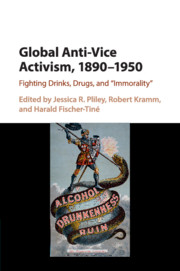Book contents
- Frontmatter
- Contents
- List of figures
- List of tables
- Notes on contributors
- Acknowledgments
- 1 Introduction: a plea for a “vicious turn” in global history
- PART I HEALTH AND THE BODY
- 2 Modernity, vice, and the problem of nakedness
- 3 “Godless Edens”: surveillance, eroticized anarchy, and “depraved communities” in Britain and the wider world, 1890–1930
- 4 Physical culture as “natural healing”: Eugen Sandow's campaign against the vices of civilization c. 1890–1920
- PART II DRINKS AND DRUGS
- PART III PROSTITUTION AND SEX TRAFFICKING
- Index
3 - “Godless Edens”: surveillance, eroticized anarchy, and “depraved communities” in Britain and the wider world, 1890–1930
from PART I - HEALTH AND THE BODY
Published online by Cambridge University Press: 05 July 2016
- Frontmatter
- Contents
- List of figures
- List of tables
- Notes on contributors
- Acknowledgments
- 1 Introduction: a plea for a “vicious turn” in global history
- PART I HEALTH AND THE BODY
- 2 Modernity, vice, and the problem of nakedness
- 3 “Godless Edens”: surveillance, eroticized anarchy, and “depraved communities” in Britain and the wider world, 1890–1930
- 4 Physical culture as “natural healing”: Eugen Sandow's campaign against the vices of civilization c. 1890–1920
- PART II DRINKS AND DRUGS
- PART III PROSTITUTION AND SEX TRAFFICKING
- Index
Summary
Ranging from Tolstoyan communes, through quasi-religious sects, to artistic and bohemian alternatives to conventional society, the new radical communal settlements of the late nineteenth and early twentieth centuries attracted considerable voyeuristic and censorious attention from the state, police, anti-vice activists, and near neighbors. The freakish and unconventional nature of these colonies is reaffirmed in much of the historiography relating to their existence and by the desire of those reformers who came afterward to distance themselves from their apparent excesses. Itinerancy, rootlessness, “sexual deviance,” atheism, and “immorality” remained constant charges against the inhabitants. Multiple issues surrounded the creation of land communes, and their establishment revealed fissures within popular politics that fueled the tensions between upholders of the values of morality, modesty, temperance, and anti-vice activism, and the colonies themselves, which were perceived as detrimental to prevailing social and moral norms.
This chapter analyzes a range of secular, religious, socialist, and völkisch communities to establish the communalities in their attitudes, but also in order to chart the fault line that divided inhabitants of the new experimental settlements dedicated to a profound transformation of human society from the organized anti-vice agitations of the later nineteenth century. It explores the issue of schism within the ranks of anti-vice activists and demonstrates the ways in which exponents of utopian models of alternative societies were often relegated to the margins despite their enthusiasm for the reform of human character. Moreover, it locates these errant communities in the context of a backlash that established the commonplace accusations against radicals, socialists, and left utopians that became increasingly standard in the late nineteenth century and the first decade of the twentieth. Through an examination of popular responses to these settlements, this chapter charts the sensationalist literature that ridiculed, or emphasized, the dangers accompanying any wider acceptance of the unconventional ideas preached at experimental colonies like Whiteway (in England) and at Monte Verità (in Switzerland), which became notorious as hotbeds of vice and alternative living. Such material problematizes the relationship between anti-vice activism as a movement of protest, and the activities of the inhabitants of colonies dedicated to a cleansing of society from the ills of drink, nicotine dependency, and other vices.
- Type
- Chapter
- Information
- Global Anti-Vice Activism, 1890–1950Fighting Drinks, Drugs, and 'Immorality', pp. 53 - 73Publisher: Cambridge University PressPrint publication year: 2016
- 1
- Cited by



